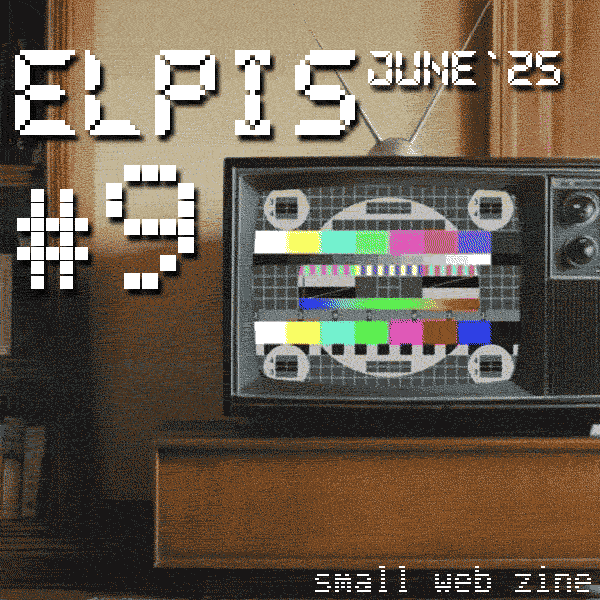Thanks for the feedback.
Some issues were written in Ukrainian, some in Russian, it just worked out. Later they were translated into English.
I wanted to try something new that would read like a paper edition, I hope it works out so far.
Eight-bit covers also didn’t come so easily, because here (as you’ve already noticed) there’s a bias towards downgrade.
First of all, the magazine is tested on our community, many people read, although not all the articles, selectively. But I can’t help but please everyone. That’s why the articles are of different directions, of different quality, because sometimes it’s just food for thought, sometimes something to laugh about.
But for now I’m thinking where it’s better to lean towards humor or educational content, and what do you think?
I just finished reading the small ode to the small web article of issue 2, which indeed gave me food for thought.
I enjoy a mix of styles, some more earnest, some funny, some educational, some just for fun. The most important thing is: What would you want to read, what is of interest to you? And then go and write that/ in that style. And then your readers can decide what they’re in the mood for right now. And come back later for something else.
I ask you, if you find time after reading - write a review in the guest book, about what you would like to read, what topics you are interested in. What to improve, what to add
Another fine issue. Kind of revisionist in places: for one thing, the west loves credit cards. Heck, Sweden almost got rid of cash entirely for a while, then suddenly realized it was a disaster waiting to happen and took a U-turn on the issue. As for piracy, the only reason why it could be rampant in Eastern Europe was that we didn’t have author’s rights laws until the mid-1990s. There was no such loophole in western countries, so they always cracked down on piracy. It was just hard to do it for a while, when it came to computers.
Oh, and by the way, large popular IRC networks like Libera and OFTC never went anywhere. The only thing that changed is what people know about. Much like with RSS and XMPP.
West means the USA, where cash is still cool. In European countries, it depends on where. Maybe I should rewrite this fragment?
Nah, it’s okay. It’s your viewpoint after all. Besides, even in the US it’s complicated. In many places people look at you funny if you try to pay with cash, but on the other hand bank cards can fail at any time for various reasons, so it depends.
Yeah, the Girl Scouts where I’m at have recently started taking card and Venmo for Girl Scout cookies because few people around here (in New England) carry any cash.
https://elpis.ws/cgi-bin/cms/articles
Hello everyone!
I present to your attention the 7th issue of the magazine
This is a weird one, but congrats!
I loved reading the first article. ![]()
![]() why u think so?
why u think so? ![]()
because of the cover?
I was thinking about doing a similar episode, but I don’t have enough jokes yet
I always look forward to these when they come out :) Loved the Easter Eggs article!
which one did you like the most?
#9 issue of small web magazine is out - Have a nice summer, it will be hot ;-)

This time, a little late. This issue will be a little unusual - more nostalgia, more tears, more humor, I missed a little with the theoretical part, and the historical one, but I hope this will be compensated in future. Issues will be published less frequently now: it all depends on how many materials are sent. Sometimes articles come by themselves, and sometimes you have to correspond with authors for a long time, edit, explain - not because the texts are bad, but because it is not immediately possible to “get the style”. But it’s simple: read a couple of issues - and you will understand what voice this magazine speaks in.
“The User Must Suffer”! Last Century HTML Webmastering Masterclass made me laugh so much.
I have a splash page on one of my websites. That’s because I mostly share links to those pages with friends, discreetly. As a bonus, it slows down badly behaved crawlers. It’s not like search engines help sites get traffic anymore. They just use up bandwidth for nothing.
Edit: but no, I don’t want retrocomputing to just relive the old days. I want new software that can run well on old machines. Like Haiku does. Heck, it now runs well on hardware so old you can’t even find working machines anymore. And the thing is, we could make hardware like that again, much more cheaply than the hyper-advanced assembly lines for 12-core hybrid ARM chips. It could be useful, not just a toy. And it could be local.
But how are kids supposed to know why it’s important, and how to do things like in the old days, if we berate them instead of teaching?
I want to write new Pascal apps that serve current purposes. And I can. It’s up to me.
I love Carpet TV; it’s brilliant.


